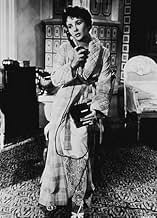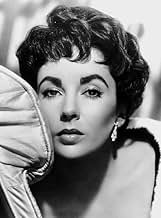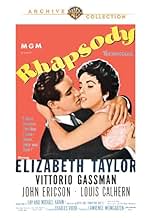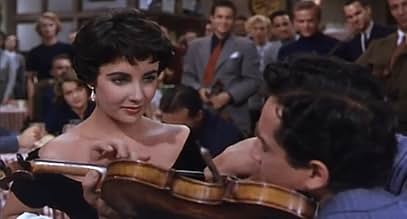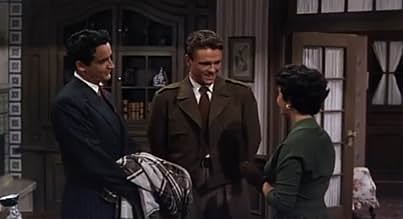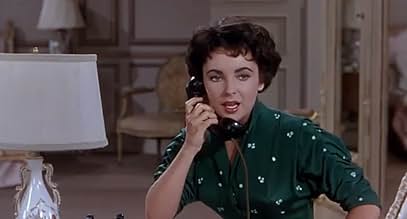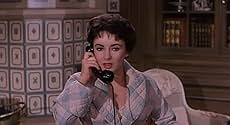ÉVALUATION IMDb
6,1/10
1,3 k
MA NOTE
Ajouter une intrigue dans votre langueRich beauty Louise Durant follows her violinist lover to conservatory in Zurich. A pianist there falls for her. Violinist prioritizes music over Louise, pianist loves Louise more. She must c... Tout lireRich beauty Louise Durant follows her violinist lover to conservatory in Zurich. A pianist there falls for her. Violinist prioritizes music over Louise, pianist loves Louise more. She must choose between the two men.Rich beauty Louise Durant follows her violinist lover to conservatory in Zurich. A pianist there falls for her. Violinist prioritizes music over Louise, pianist loves Louise more. She must choose between the two men.
Frank Arnold
- News Vendor
- (uncredited)
Max Barwyn
- Patron
- (uncredited)
George Calliga
- Passerby on Street
- (uncredited)
Avis en vedette
This is just to correct some misinformation in a previous comment. Maybe I'm splitting hairs, but facts are facts. In 1954, at the time of Rhapsody, the gorgeous Miss Taylor was 22, not 18. Her beautiful wardrobe is by Helen Rose, M-G-M's in-house designer of the 50's. (Yes, Virginia, there were other costume designers besides Edith Head!)
As far as the script for this ode to classical music goes it includes absolutely nothing you haven't seen before but it's presented with that inimitable MGM sheen.
Made during that period when Elizabeth Taylor was at the very apex of her beauty she captivates as she drips in jewels and beautiful gowns in dazzling Technicolor. She's hard to pull your eyes from but she is teamed with two men, Vittorio Gassman and John Ericson, who are almost as beautiful as she. Excepting Louis Calhern who is just right as Liz's bon vivant father, the supporting cast blends into the woodwork.
It's the music that matters and makes this picture however. Some of it is absurdly staged, i.e. the spontaneous performance of an entire violin symphony in a small restaurant, but what can you expect from a romantic drama in the 50's. Mostly though the music is played full out in the proper settings and is glorious and well worth muddling through the somewhat turgid proceedings that surround it.
Made during that period when Elizabeth Taylor was at the very apex of her beauty she captivates as she drips in jewels and beautiful gowns in dazzling Technicolor. She's hard to pull your eyes from but she is teamed with two men, Vittorio Gassman and John Ericson, who are almost as beautiful as she. Excepting Louis Calhern who is just right as Liz's bon vivant father, the supporting cast blends into the woodwork.
It's the music that matters and makes this picture however. Some of it is absurdly staged, i.e. the spontaneous performance of an entire violin symphony in a small restaurant, but what can you expect from a romantic drama in the 50's. Mostly though the music is played full out in the proper settings and is glorious and well worth muddling through the somewhat turgid proceedings that surround it.
RHAPSODY is a typically lush romantic opus from MGM, conceived as a stunning tribute to the 22 year-old ELIZABETH TAYLOR and surrounding her with some melodious classic music from the two men in her life--JOHN ERICSON and VITTORIO GASSMAN.
All women should have such romantic woes--torn as she is, between two handsome men with matinée idol looks while she watches on the sidelines dressed in smart outfits by Helen Rose, with sophisticated looks at the camera and everyone else in the cast. She is as poised as a marble statue and just as cold and beautiful.
The tale is as wildly improbable as anything Joan Crawford ever did in lush B&W surroundings at Warner Bros. (a la HUMORESQUE), and the story itself is hardly more than routine, presenting Taylor as a spoiled young woman who mistreats men who are too immersed in their careers to notice she's around.
But on the plus side, there's that glorious music and some very convincing finger work by Ericson on the piano and Gassman on the violin. They really look as if they're playing their instruments, and both of them are up to the acting demands of their less than dynamic roles.
Taylor was certainly one of the most photogenic women who ever stepped before a camera, but it's a pity that her talent (at this stage) is not a match for her fabulous wardrobe and glossy, tremulous close-ups that have her torn between two men without ever ruining her make-up with real tears.
Absurd fun, if only for the music and the decent performances, but actually a very routine romantic angle that is a mere trifle against a splendid background of passionate classical pieces.
All women should have such romantic woes--torn as she is, between two handsome men with matinée idol looks while she watches on the sidelines dressed in smart outfits by Helen Rose, with sophisticated looks at the camera and everyone else in the cast. She is as poised as a marble statue and just as cold and beautiful.
The tale is as wildly improbable as anything Joan Crawford ever did in lush B&W surroundings at Warner Bros. (a la HUMORESQUE), and the story itself is hardly more than routine, presenting Taylor as a spoiled young woman who mistreats men who are too immersed in their careers to notice she's around.
But on the plus side, there's that glorious music and some very convincing finger work by Ericson on the piano and Gassman on the violin. They really look as if they're playing their instruments, and both of them are up to the acting demands of their less than dynamic roles.
Taylor was certainly one of the most photogenic women who ever stepped before a camera, but it's a pity that her talent (at this stage) is not a match for her fabulous wardrobe and glossy, tremulous close-ups that have her torn between two men without ever ruining her make-up with real tears.
Absurd fun, if only for the music and the decent performances, but actually a very routine romantic angle that is a mere trifle against a splendid background of passionate classical pieces.
Yes, Rapshody is somewhat tedious and quite melodramatic, but let me mention the positive offsets:
1. The dazzlingly beautiful, voluptuous Elizabeth Taylor.
2. Adult themes, and must have been considered quite risqué at the time.
3. Emotionally charged classical music.
4. Generally quite well acted.
5. Good direction, cinematography, settings, and costumes.
Whether or not the positive offsets overcome the somewhat tedious, melodramatic plot depends on one's tolerance for melodrama and how strongly one values the various offsets.
1. The dazzlingly beautiful, voluptuous Elizabeth Taylor.
2. Adult themes, and must have been considered quite risqué at the time.
3. Emotionally charged classical music.
4. Generally quite well acted.
5. Good direction, cinematography, settings, and costumes.
Whether or not the positive offsets overcome the somewhat tedious, melodramatic plot depends on one's tolerance for melodrama and how strongly one values the various offsets.
"Rhapsody" is not the bad movie some of the comments to IMDb seem to indicate. While this was a film typical of the time when it was made, it offers some of the most glorious music ever heard in a Hollywood picture. The music takes center stage in the movie. As interpreted by Michael Rabin and Claudio Arrau, among others, Tchaikowsky, Liszt and Rachmaninoff were never given such loving tribute as in this film.
Charles Vidor directed this adaptation of a novel that might have been well regarded, enough to be brought to the screen. Ruth and August Goetz are given credit for the screen play. The Goetzes wrote many plays, among them, "The Heiress". Fay and Michael Kanin also contributed to the adaptation.
The story of Louise "Lulu" Durant, a spoiled rich girl, that defied her father into following what she thought was the love of her life, turns out to be a nightmare. Lulu was not prepared to play second fiddle, no pun intended, to anyone, let alone Paul Bronte, the talented, but egotistical violinist that is only in love with his career.
The story, by the way, takes place in Zurich, and not Munich, as someone reported in another comment. Lulu, who has ambitions of becoming a pianist, promptly realizes she is a lousy player and heeds the advice of the wise professor Schuman, but she makes the mistake of staying around, getting bored because Paul has only time for his music and not for her.
Enter James Guest, an American pianist. He falls in love with the beautiful Lulu, only to be rejected. When Paul becomes the toast of the music world, he breaks from Lulu, who in turn marries James on the rebound. Ultimately, Lulu realizes that James is the one that is real and the only one that cares for her and there's a happy ending when he makes a stunning debut playing Rachmaninoff's Second Piano Concerto.
Elizabeth Taylor, in all her beauty, is seen as the ravishing creature she was in those years. She made an impression as the spoiled "papa's girl" that she was. In this film, as well as all those Ms. Taylor made during those years, she projects such a loving presence that is hard to find fault with her acting. This actress showed such magnetism and charisma in her films, something perhaps no one else can match.
Vittorio Gassman was perhaps Italy's best modern actor. He was trying to break into American movies. As Paul Bronte, he makes quite an impression. He was dashing and had the presence and good looks to play opposite his gorgeous costar.
John Ericson shows he had potential to go far in the business. Unfortunately he never made it big in Hollywood. He was an accomplished actor who deserved better. Louis Calhern as Nicholas Durant, Lulu's father had only a few scenes in the movie, so it is puzzling for one to agree with another comment about how he carried the film on his shoulders. If it was, it remains a mystery to us. Mr. Calhern was a fine actor who show a natural elegance to every thing he did in the movies.
Ms. Taylor is dressed by Helen Rose, one of the best in the business. Ms. Rose designs are an asset; anything that Elizabeth Taylor wore in the film enhanced her figure and gave the viewer an opportunity to see her as the film goddess was always was.
Charles Vidor directed this adaptation of a novel that might have been well regarded, enough to be brought to the screen. Ruth and August Goetz are given credit for the screen play. The Goetzes wrote many plays, among them, "The Heiress". Fay and Michael Kanin also contributed to the adaptation.
The story of Louise "Lulu" Durant, a spoiled rich girl, that defied her father into following what she thought was the love of her life, turns out to be a nightmare. Lulu was not prepared to play second fiddle, no pun intended, to anyone, let alone Paul Bronte, the talented, but egotistical violinist that is only in love with his career.
The story, by the way, takes place in Zurich, and not Munich, as someone reported in another comment. Lulu, who has ambitions of becoming a pianist, promptly realizes she is a lousy player and heeds the advice of the wise professor Schuman, but she makes the mistake of staying around, getting bored because Paul has only time for his music and not for her.
Enter James Guest, an American pianist. He falls in love with the beautiful Lulu, only to be rejected. When Paul becomes the toast of the music world, he breaks from Lulu, who in turn marries James on the rebound. Ultimately, Lulu realizes that James is the one that is real and the only one that cares for her and there's a happy ending when he makes a stunning debut playing Rachmaninoff's Second Piano Concerto.
Elizabeth Taylor, in all her beauty, is seen as the ravishing creature she was in those years. She made an impression as the spoiled "papa's girl" that she was. In this film, as well as all those Ms. Taylor made during those years, she projects such a loving presence that is hard to find fault with her acting. This actress showed such magnetism and charisma in her films, something perhaps no one else can match.
Vittorio Gassman was perhaps Italy's best modern actor. He was trying to break into American movies. As Paul Bronte, he makes quite an impression. He was dashing and had the presence and good looks to play opposite his gorgeous costar.
John Ericson shows he had potential to go far in the business. Unfortunately he never made it big in Hollywood. He was an accomplished actor who deserved better. Louis Calhern as Nicholas Durant, Lulu's father had only a few scenes in the movie, so it is puzzling for one to agree with another comment about how he carried the film on his shoulders. If it was, it remains a mystery to us. Mr. Calhern was a fine actor who show a natural elegance to every thing he did in the movies.
Ms. Taylor is dressed by Helen Rose, one of the best in the business. Ms. Rose designs are an asset; anything that Elizabeth Taylor wore in the film enhanced her figure and gave the viewer an opportunity to see her as the film goddess was always was.
Le saviez-vous
- AnecdotesIncluded among the American Film Institute's 2002 list of 400 movies nominated for the top 100 top 100 America's Greatest Love Stories movies.
- GaffesEarlier in the film, Louise receives a telegram from her father, which is addressed to her at "62 Riflestrasse". Later in the film, when James enters her apartment building, the number is clearly seen to be "37".
- ConnexionsFeatured in Legendy mirovogo kino: Michael Chekhov
- Bandes originalesConcerto In D Major For Violin And Orchestra
Music by Pyotr Ilyich Tchaikovsky
Meilleurs choix
Connectez-vous pour évaluer et surveiller les recommandations personnalisées
- How long is Rhapsody?Propulsé par Alexa
Détails
Box-office
- Brut – États-Unis et Canada
- 1 300 000 $ US
- Durée1 heure 55 minutes
- Couleur
Contribuer à cette page
Suggérer une modification ou ajouter du contenu manquant



